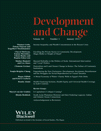Land Library
Welcome to the Land Portal Library. Explore our vast collection of open-access resources (over 74,000) including reports, journal articles, research papers, peer-reviewed publications, legal documents, videos and much more.
/ library resources
Showing items 1 through 9 of 46.Climate change affects poor and marginalized communities first and hardest.
This case study in the World Resources Report, “Towards a More Equal City,” examines transformative urban change in Ahmedabad, India, by analyzing the land pooling and readjustment mechanism called Town Planning Scheme (TPS).
More than half the villages of Madhya Pradesh and Chhattisgarh are affected by a peculiar issue of tenurial ambiguity called “orange areas.” This issue impacts nearly 1.2 million hectares and 1.5 million, largely poor, landless and tribal families, that depend on these lands for food, fuel, fodde
Rapidly urbanizing Indian cities need mechanisms to ensure that land is acquired, planned, and serviced with adequate infrastructure and social amenities, to prevent the occurrence of haphazard urban expansion and under-provisioned inner-city areas.
Violent conflicts between nomadic herders from northern Nigeria and sedentary agrarian communities in the central and southern zones have escalated in recent years and are spreading southward, threatening the country’s security and stability.
This report consolidates findings from previous activities by FAO and other stakeholders, and identifies in the four focus countries (Ethiopia, 
Until recently, the Pokot in the highlands of the Baringo area in Kenya have practised semi-nomadic pastoralism. Today they are rapidly sedentarizing and in many areas suitable for farming, they are adopting rain-fed agriculture.
This topic guide for government agencies, service providers and other practitioners examines various dimensions of governance that are key to deliver appropriate benefit-sharing, ensure sustainable exploitation, minimise conflict over access and control, and maximise the contribution of resources
Pastoralists are one of the most poverty stricken and underdeveloped existing human groups in the world. Until now, having remained practically invisible in the eyes of international law, it is desirable to open a debate concerning the recognition of their rights.









